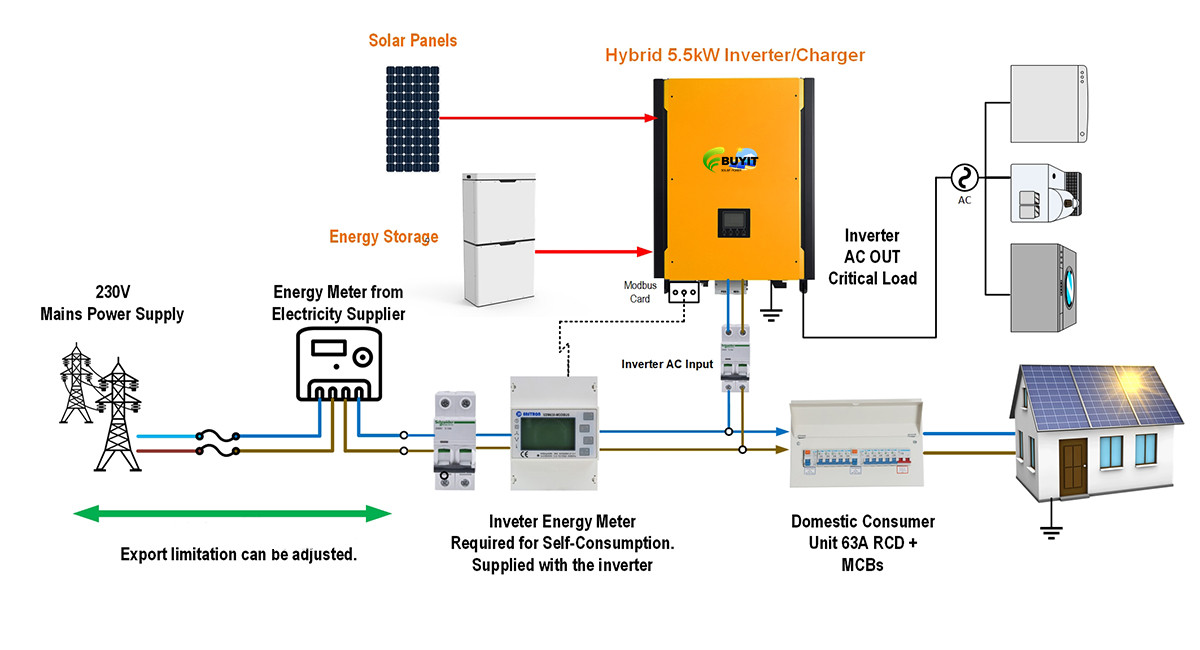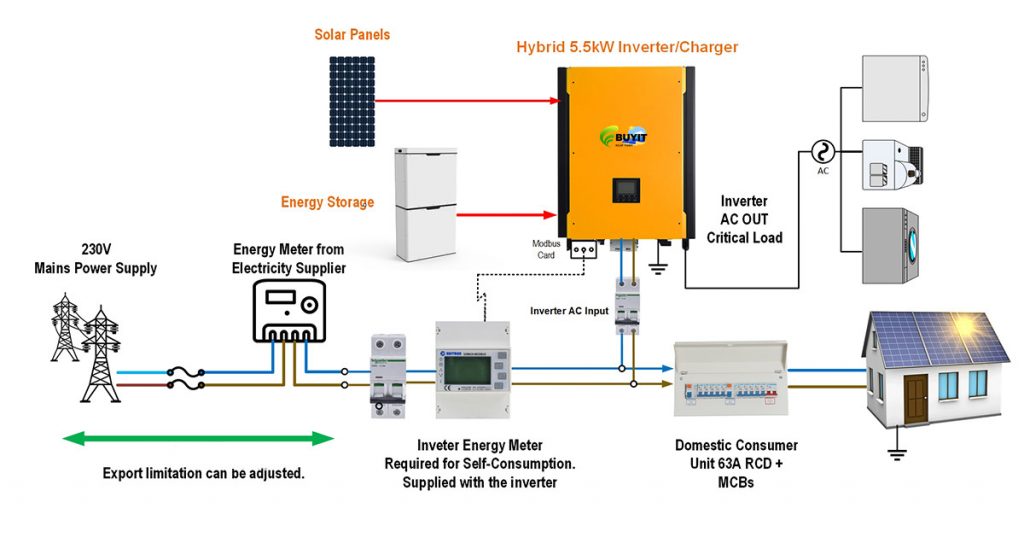
The difference between photovoltaic inverters and energy storage inverters
With the continuous development and progress of solar photovoltaic power generation technology, photovoltaic inverters and energy storage inverters have gradually become indispensable components of solar photovoltaic power stations. Although both are inverters, they are very different in design, application, performance, etc. This article will detail the differences between photovoltaic inverters and energy storage inverters.

- Definition and Principle
A photovoltaic inverter is an electrical device that converts DC power into AC power and is commonly used in solar photovoltaic systems. Its principle is to convert the DC power emitted by photovoltaic panels into AC power to meet household and industrial power needs. It usually includes a transformer, a set of electronic components and integrated circuits, which can convert the direct current (DC) emitted by photovoltaic panels into the alternating current (AC) commonly used in our daily lives.
The function of an energy storage inverter is not only to convert DC power into AC power, but also to use energy storage devices such as batteries to store electrical energy, and then release electrical energy from the storage device when needed. Energy storage inverters usually have the characteristics of bidirectional power conversion, high-efficiency charge and discharge, etc., and can realize the supply and utilization of a variety of energy sources.
- Application scenarios
Photovoltaic inverters are mostly used in solar photovoltaic systems in industrial areas and residential areas. They are mainly used to transport photovoltaic panels to power-consuming areas through alternating current. In addition, large photovoltaic power stations also need to use photovoltaic inverters to convert the emitted direct current into alternating current.
Energy storage inverters are mainly used in energy storage systems or power grids, especially in industries with large amounts of renewable energy such as solar energy and wind energy, to achieve effective management and regulation of these new energy sources by the power grid. Energy storage inverters can use devices such as batteries to store energy and provide energy to grid builders at night or during cloudy periods during the day.
3.Working method
The working principle of a photovoltaic inverter is similar to that of an ordinary inverter, converting direct current into alternating current. However, the photovoltaic inverter needs to adjust both the magnitude and frequency of the DC voltage in order to convert the DC power into AC power suitable for the application. In addition, photovoltaic inverters have some other functions, such as smoothing power fluctuations, protection devices, data logging devices, etc.
The working principle of energy storage inverter is different from that of photovoltaic inverter. It has characteristics between conventional inverter and bidirectional DC/AC converter. The energy storage inverter can collect electrical energy from renewable energy systems such as solar energy and wind energy and store it in the battery; when it is used, this stored electrical energy can be released and converted to the grid or directly into output power. . In addition, the energy storage inverter protects and manages the battery pack by controlling parameters such as current, voltage, power, and temperature during battery charging and discharging.

4.Performance indicators
Photovoltaic inverters and energy storage inverters also differ in performance indicators. Photovoltaic inverters mainly consider the following indicators:
1) Efficiency: The efficiency of a photovoltaic inverter refers to the ability to convert direct current into alternating current. Therefore, the higher its efficiency, the smaller the power loss of the conversion. Generally speaking, the efficiency of photovoltaic inverters is required to be above 90%.
2) Power density: Photovoltaic inverters need to meet certain power requirements during use. Therefore, its power density has become an important performance indicator, which is generally required to be 1.5~3.0W/cm2.
3) Protection level: Photovoltaic inverters should have good environmental adaptability, so their external structures should have corresponding waterproof, dustproof, earthquake resistance, fireproof and other capabilities. At present, domestic and foreign standards require that the protection level of photovoltaic inverters is no less than IP54.
The performance indicators of energy storage inverters have the following indicators:
1) Response speed: The energy storage inverter should have fast and stable response characteristics. When the load of the system changes, the energy storage inverter should have the ability to respond quickly.
2) Conversion efficiency: The energy conversion efficiency of the energy storage inverter should be relatively high to ensure storage and discharge efficiency.
3) Storage energy density: In order to achieve efficient storage function, the storage energy density of the energy storage inverter should be as large as possible.
- Cost
There is also a big difference in the cost of photovoltaic inverters and energy storage inverters. Generally speaking, the number of photovoltaic inverters is much greater than that of energy storage inverters, and the price of photovoltaic inverters is relatively low, generally between 50,000 and 100,000 yuan. The energy storage inverter is a relatively high-end product, generally priced at more than hundreds of thousands of yuan. It requires the use of a large number of batteries and complex technical debugging, so the cost of use is also relatively expensive.
In short, although photovoltaic inverters and energy storage inverters are both inverters, there are certain differences in their scope of application, working methods, performance characteristics, etc. Therefore, in the actual application process, the selection of the two should be comprehensively considered based on actual needs.
Buyit have both photovoltaic inverters and energy storage inverters, If you want to know more information, Please connect What’s app: 008613808405352
- OFF GRID INVERTER15 products
- OFF+ON GRID INVERTER10 products
- DC FAST charging station9 products
- Charging controller2 products
- Lithium battery6 products
- Solar panels2 products
- 110/120VAC Solar Inverter2 products
- Stock in EU warehouse, delivery 3-7 days to EU3 products
- Transformer2 products
- Online UPS1 product
- water pump inverter3 products
- Solar Accessories5 products
- Uncategorized1 product